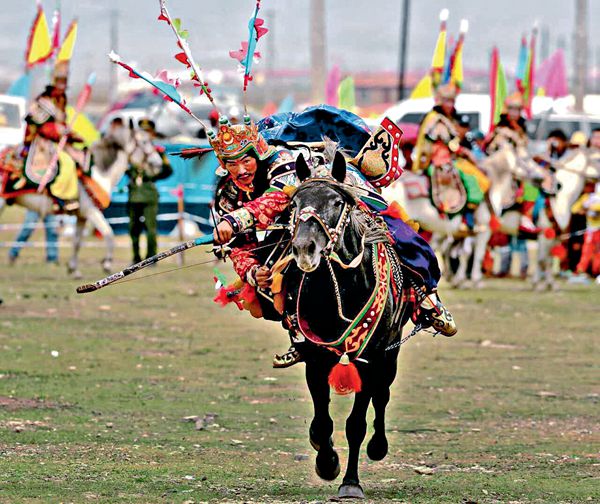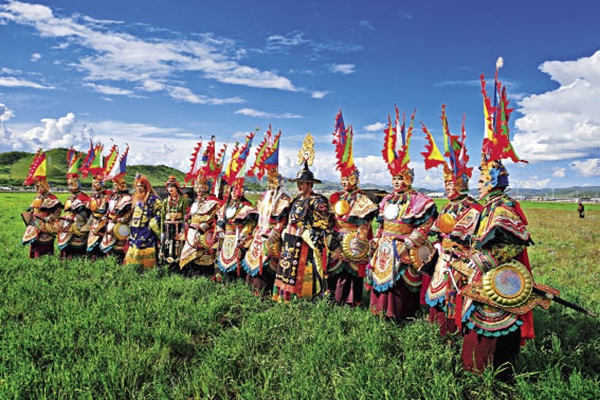King Gesar to Hit the Silver Screen
China Today, November 10, 2016 Adjust font size:

A mounted Tibetan Opera play about King Gesar in Golog Tibetan Autonomous Prefecture, Qinghai Province.
Written using more than 20 million characters over 120-plus volumes, King Gesar is longer than all world-renowned epics combined. Such a size is challenging for a film adaptation that normally runs for a couple of hours. It is, however, the life ambition of Jampel Gyatso, an ethnic literature researcher with the Chinese Academy of Social Sciences and a Gesarological expert.
According to Jampel Gyatso, the Chinese government has invested huge human and financial resources to preserve this oral Tibetan cultural heritage over the past decades. To date more than five million copies of King Gesar have been printed, enough for one copy for every Tibetan in China.
It is the shared belief of Deyang and Jampel Gyatso that a splendid cultural heritage like King Gesar should be shared by all humankind and not restricted to one ethnic group. As a leading figure in the study of the epic and China’s first Tibetan professor for doctoral programs, Jampel Gyatso took a major role in the planning and production of the upcoming film.
“Movies can to certain extent overcome language barriers, and they are, therefore, one of the best media to introduce Chinese culture to the world,” said Deyang.
Despite the remarkable progress China has made in the research of King Gesar over the past years, the country lags behind the U.S. and Europe in retrofitting ancient epics into various art forms to fully tap their cultural significance, said Jampel Gyatso.
There is a huge market for epic movies. Many ancient stories such as those by Homer and Indian epics have been rendered into film, TV series, and other art forms that are well received. The 2003 Hollywood blockbuster Troy, loosely based on The Iliad, was viewed by hundreds of millions of people globally, and was among the highest grossing films of 2004. Hot on its heels came Der Ring des Nibelungen and Beowulf. The three made a big splash on the international film market. But in China not a single indigenous saga has made it to the big screen.

The Sertar Tibetan Opera Troupe.
When Jampel Gyatso studied at Harvard as a visiting scholar over a decade ago, someone there suggested to him that China made a film of King Gesar. In his later visits to India he was impressed that its prolific film industry had produced three or four films based on Indian ancient epic poems The Ramayama and The Mahabharat. These experiences enhanced his desire to bring the Tibetan saga to the silver screen.
“All the four classical novels of Chinese literature have now had film and TV adaptations. King Gesar must join the club and in doing so, highlight the fact that China is a big family of different ethnic groups,” said Jampel Gyatso. He hopes that the film he is working on will run for the Academy Awards, which have seldom been won by Chinese filmmakers.